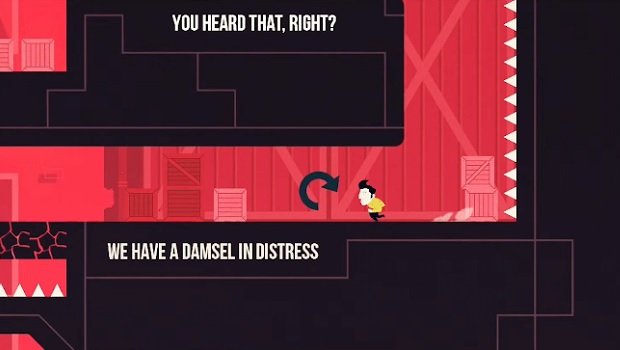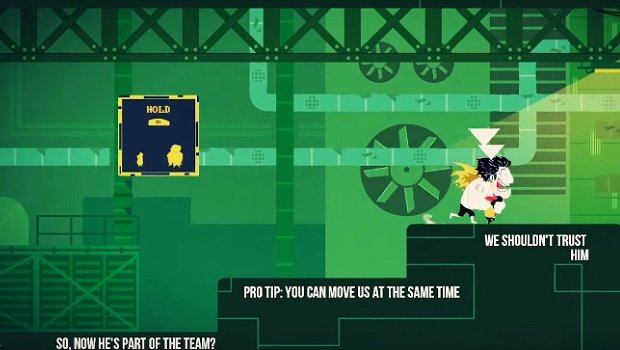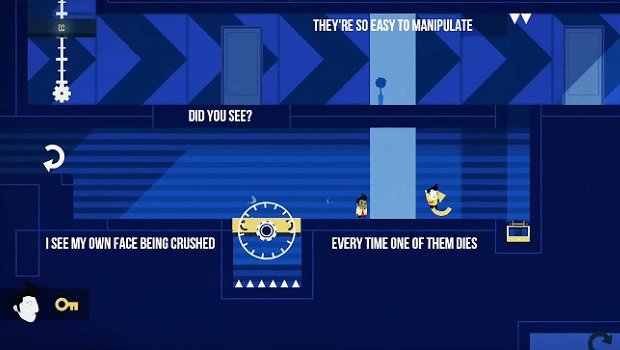Buzz saws and business suits: You should be playing Klaus
You wake up in the morning, head to work, clock in, complete your allotted daily tasks, head home, then do it all again the next day, trapped in this routine for the rest of your life. This seems like a terrible subject to craft a video game around, as many people flock to video games to escape their daily grind, not seek out more of it. But Klaus, a darkly comic, highly self-aware puzzle platformer wants to shine a light on the drudgery of corporate life, and maybe get us to laugh a little bit at the futility of it all - and it all starts with a little guy named, well, Klaus.

You take control of Klaus at the bottom floor of a massive factory. Note that I said you "take control of Klaus", not that you "are Klaus". Klaus is Klaus, a seemingly insignificant man with a pompadour, a snazzy canary-yellow Oxford button-up and a red-striped power tie. He has his own thoughts, feelings, worries, and regrets, relayed to you through slick text that pops up on the screen and the occasional grunt or sigh that comes out of the PS4 controller's speaker. He has no recollection of who he is; why he's in this mysterious, color-coded building made out of right angles, 1950s computer panels, and sardonic motivational posters; or why he can't seem to do anything without your help. All he knows is his name, thanks to a convenient tattoo on his arm. He knows that he's probably an employee of this faceless corporation. And he knows that he wants to find a way out, ASAP.
So you aren't Klaus; you are you, the person holding the controller. You're trying to help him out, maneuvering him past pits of spikes, rotating buzz saws, and other implements of death and destruction (don't question why there are spike-pits in an industrial factory building, just keep running and double-jumping), though your role in the proceedings is as much a mystery as the little salaryman that you're controlling. Klaus knows you exist and talks to you directly, often questioning your decisions or lamenting his lack of agency and the fact that you can literally read his every thought. He accepts your help at first, but he quickly begins to resent your presence - as much as you don't know who Klaus is, Klaus doesn't know who you are, either.

Discovering the answers behind these mysteries is the driving factor that will propel you through Klaus' many ingeniously designed challenges. Things start out rather simply - jump a gap here, find a key to unlock a door over there - but it becomes more demanding as new obstacles and gameplay mechanics are introduced, until you're juggling two different characters and bouncing off electrified platforms while avoiding coffee-cup throwing robots who look an awful lot like Klaus. All the while, Klaus' comments on his current predicament wallpaper each of the rooms you plow through, the game's twisted brand of wry humor poking out of every perilous corner.
Each new floor of the building offers some new wrinkle to the formula to spice things up, as well as hiding a plethora of secret challenges that blur the lines between the real and the abstract. It's here that Klaus gets really strange, forcing you to run through a variety of postmodern existentialist gauntlets, like one where all the platforms have been replaced with the word SUCCESS in big bold yellow letters, the spikes replaced with FEAR OF FAILURE in red. Completing these optional challenges aren't simply fun to find and complete in their own right, they also offer up a little bit more of Klaus' backstory, as well as the history of the corporate building he finds himself trapped inside.

Every single gain you make offers a little peek behind the curtain, another glimpse into your relationship with Klaus, and with the corporation he's trying to break out of. And when you do discover the game's biggest secrets, the facade built up between the two of you begins to crumble to the ground, even going so far as to directly disobey your controller inputs. What makes Klaus so exciting is how it consistently finds new ways to twist your expectations, to bleed out just a little bit more into the real world, to make the capital-Y 'You' feel like an important participant in this story while constantly reminding you that you are not the main character. Half of the fun is discovering those moments for yourself.
It's clear that Klaus takes inspiration from twitch-based sidescrolling platformers like Super Meat Boy and Mega Man (the PSN description says as much), but it also takes more than a few cues from modern fourth wall-breaking classics like BioShock and Spec Ops: The Line to tell a cautionary tale about how we give so much of our lives to the corporations we work for. It's worth getting through its rough patches to see what Klaus has to offer, because it goes to some hilarious, exciting, and surprisingly thought-provoking places. If you've ever stared at the clock on your office wall waiting for the exact moment you're released from your corporate prison, take some solace in Klaus, a charming, super-stylish, gleefully self-aware opportunity to have a chuckle about the bleak, Sisyphean routine of human existence.
Sign up to the GamesRadar+ Newsletter
Weekly digests, tales from the communities you love, and more



